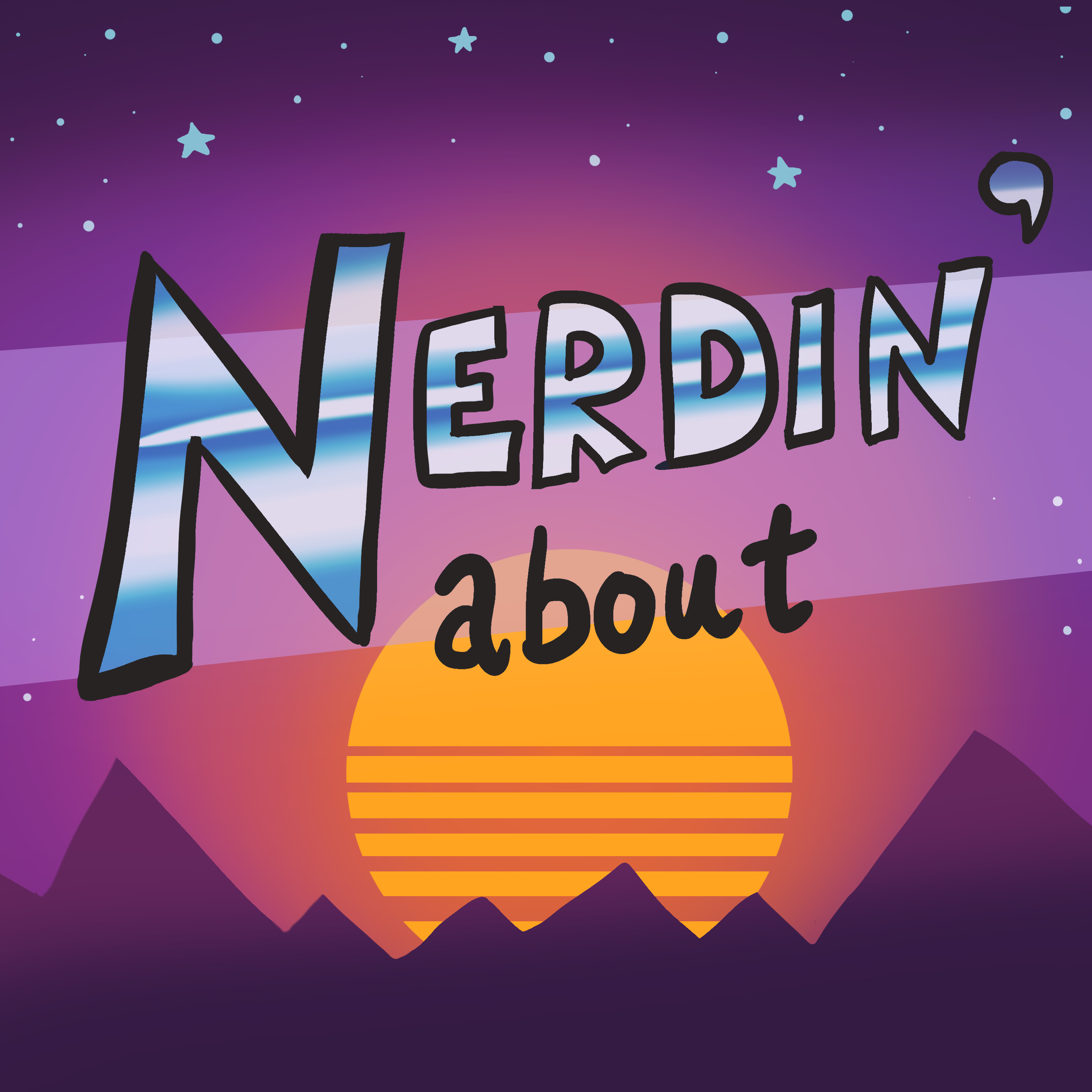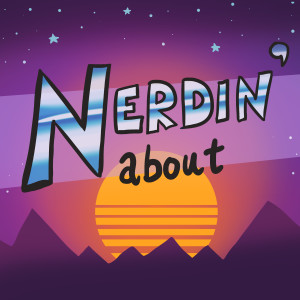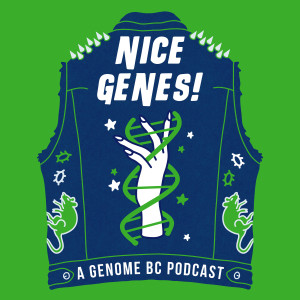
We’ve got questions, and nerds have answers! Fuelled by a curiosity to understand the world around us – from the critters beneath our feet to the far reaches of the galaxy - Nerdin’ About is a podcast where passionate nerds tell us about their research, their interests, and what they’ve been Nerdin’ About lately. A spin-off of Nerd Nite Vancouver, a community lecture series held in a bar, Nerdin’ About is here to explore these questions with you. Hosted by rat researcher Kaylee Byers (she/her) and astronomy educator Michael Unger (he/him). Elise Lane (she/her) is our Mixing Engineer. Music by Jay Arner. Phone jingle by Pramodh Senarath Yapa. Artwork by Armin Mortazavi.
Episodes

Saturday Aug 27, 2022
Season Ending Summer Bonus
Saturday Aug 27, 2022
Saturday Aug 27, 2022
When we started Nerdin’ About in March 2020 it was a way to stay engaged with the science communication community and start a podcast which was something Kaylee and Michael have always wanted to do. Now we’re completed three seasons, and it all feels so surreal.
For this final episode of the season, we’ve pulled together some extra bits from our conversations this year with ant researcher Aaron Fairweather, conservation scientist Lauren Eckert, wetland ecologist Dr. Alex Moore, registered dietician Desiree Nielsen, and Farah Qaiser Director of Research and Policy for Evidence for Democracy.
We don’t have plans for another season, but there could be special episodes that make their way into your feed. Make sure to follow Kaylee and Michael with their other podcasts Nice Genes!, and Let’s Innovate!, and follow us on social media @NerdNiteYVR for future plans for a Nerd Nite in-person return!
A transcript of this episode can be found here: https://tinyurl.com/263rdar9
Thanks as always for your support!
Nice Genes: A New Podcast from Genome BC - "Nice Genes!" - Delivers a Fun-Sized Dose of Science and Stories
Let’s Innovate!: https://www.sciencefairs.ca/get-inspired/let-s-innovate!-podcast/

Tuesday Jun 07, 2022
Running up that Climate Hill with Economics
Tuesday Jun 07, 2022
Tuesday Jun 07, 2022
How is everyone doing with their existential crises these days? If you’ve listened to past episodes you know we’ve got climate change on our collective minds, and in this episode of Nerdin’ About we talk to someone who is tackling this wicked problem with tangible solutions in economics and politics!
Dr. Devyani Singh (she/her) is a Post-Doctoral Economist Fellow working on Energy and Climate policy at the Environmental Defence Fund. Devyani nerds out with us on how she’s integrated economics into climate change solutions and advocacy. We also explore how Devyani is closing the gap between science and policy as she pursues a position in politics. A transcript of the episode can be found here: https://bit.ly/3xpYJck
Follow Devyani on Twitter and Instagram @Kumari_Devyani and follow her pup Zephyrus @WestCoastPandaBoi
Kaylee’s new podcast Nice Genes! with Genome British Columbia can be found here: https://link.chtbl.com/C5ept7S7

Wednesday May 18, 2022
Coming Soon: Nice Genes!
Wednesday May 18, 2022
Wednesday May 18, 2022
From healthcare and biotechnology to forests and fisheries, the evolving study of genomics is leading to some of the most exciting and world-changing discoveries in science and medicine. But while the study of genomics holds great promise for the health of people, animals, and the environment, it also confronts us with big questions. Join Dr. Kaylee Byers – a self-described “rat detective” and science communicator as she guides you through fascinating conversations about the what, the why, and the how of genomics.
To follow the show, visit: https://link.chtbl.com/C5ept7S7
Follow Genome British Columbia @GenomeBC on Twitter and Instagram

Tuesday Apr 26, 2022
Bonus: Let’s Innovate with Rebecca Baron
Tuesday Apr 26, 2022
Tuesday Apr 26, 2022
This week we're sharing a bonus episode in your feed from Let's Innovate, another podcast hosted by your favourite space nerd Michael Unger. In this episode, Michael speaks with Rebecca Baron, a student at the University of British Columbia and co-host of the Women's Health Interrupted podcast.
Rebecca shares her Science Fair Foundation experience, her TEDx talk in 2016 and how learning about the health benefits from plants ultimately led her to a gold medal and platinum award! A transcript of the episode can be found here: https://bit.ly/3EQmjBk
Check out the Women's Health Interrupted podcast here: https://bit.ly/3LiAEsP
Tuesday Apr 12, 2022
Wetlands: The Original Wet’N Wild
Tuesday Apr 12, 2022
Tuesday Apr 12, 2022
Grab your hip waders and waterproof phone case, because this week we’re getting ‘bog’ged down in wetland ecology! Dr. Alex Moore (they/them), who is currently a postdoctoral fellow at the Princeton University High Meadows Environmental Institute, takes us on a journey to coastlines and salt marshes to explore what wetlands are and how species shape these spaces. We also meander to mangroves to marvel at the benefits they provide for people and animals, as well as the threats they face in a warming world. A transcript of the episode can be found here: https://bit.ly/3KAFZv5
You can follow Dr. Moore on Twitter @Dr_AlexM and on their websites: www.inclusiveconservationlab.com
You can check out the bat mortality study mentioned in this episode here: https://cdnsciencepub.com/doi/abs/10.1139/cjz-2021-0230
And the study mentioned about cats depredating on rats and other wildlife here: https://www.sciencedirect.com/science/article/abs/pii/S0006320722000568

Wednesday Mar 30, 2022
Who Run the World? Ants!
Wednesday Mar 30, 2022
Wednesday Mar 30, 2022
The ants go marching one by one… but how and also why? In this episode we’re joined by Aaron Fairweather (they/them) a PhD student at the University of Guelph who has been an entomologist for as long as they could hold a crayon. Join us as we learn about how ants are more than just picnic disruptors – they’re farmers, architects, pollinators and so much more! Don’t let their size fool you – they leave a very large footprint on our ecosystems (6 footprints to be exact). A transcript of the episode can be found here: https://bit.ly/3LpAqQ6
Follow Aaron @InsectAaron, and their “fursona” Nasidoe on Twitter, Instagram, TikTok, Twitch, and YouTube @Entobird
Also check out Phlya and Fandom, a nerdy podcast merging the worlds of science and furry! https://entobird.carrd.co/
Interested in learning more about ant sounds? The sound clips in this episode were shared by Dr. Ronara de Souza Ferreira-Châline whose exciting research on this topic can be found here https://journals.plos.org/plosone/article?id=10.1371/journal.pone.0015363

Tuesday Mar 15, 2022
BEARing Down on Conservation
Tuesday Mar 15, 2022
Tuesday Mar 15, 2022
Our communities are wild spaces. Even in cities, humans are navigating relationships with wildlife - relationships that are critical to supporting conservation efforts. This week we’re joined by Lauren Eckert (she/her), a PhD candidate at the University of Victoria who studies the intersection between social and ecological systems. From bears to orcas, we explore how conflicts shape our interactions with wildlife and each other. And, we gather some helpful tips to reduce conflict with our fellow curious and adventuring bears.
Lauren is also involved with Hidden Compass, which is seeking to tell science stories in new ways, as well as the magical human behind The Witch Podcast, which looks at the legacies and power of women and femmes throughout history and today. So much to cover in such little time, thanks for listening, and bearing with us! A transcript of the episode can be found here: https://bit.ly/3w6nHxb
www.LaurenEckertConservation.com
Twitter-Instagram: @LaurenEEckert
Hidden Compass: https://www.youtube.com/channel/UCNa_vexdNjpWFJ-WMtM1pDA
The Witch Podcast: https://www.thewitchpodcast.com/
And the paper about bear genetics and Indigenous languages mentioned in this episode can be found here: https://bigthink.com/life/grizzlies-dna-language/

Tuesday Mar 01, 2022
Watery Dewing About Water?
Tuesday Mar 01, 2022
Tuesday Mar 01, 2022
From rushing rivers to vast oceans, the planet is covered in dancing droplets of water. But even in places where water is abundant, access to clean drinking water isn’t a guarantee, and many of our water-based challenges are likely to increase with climate change. In this episode, water and sustainability consultant Alan Shapiro joins us to talk about what makes water so special, how we manage water in Canada, and why we all need to talk more about water. A transcript of the episode can be found here: https://bit.ly/3MaTKC1
Follow Alan Shapiro @watercomm on Twitter!

Thursday Dec 23, 2021
Solstice Special
Thursday Dec 23, 2021
Thursday Dec 23, 2021
To get you through some long nights ahead, here’s a bonus episode of nerd outs with special guest drag performer Shanda Leer! We all nerd out along with some of your nerd outs you wrote in with. Shanda nerds out on, The Beatles “Get Back” documentary, our audio engineer Elise Lane on her new single Antoneon, and Michael and Kaylee have podcast recommendations for your holidays in The Longtime Academy, and Stuff the British Stole. Find a transcript of the episode here: https://bit.ly/3yRBp6A
Follow Shanda Leer on Twitter and Instagram
and their podcast Where the Big Boys Game
New episodes out early 2022!

Tuesday Nov 30, 2021
The Science of Swearing
Tuesday Nov 30, 2021
Tuesday Nov 30, 2021
When was the last time you swore? Maybe you were sitting in traffic, or you stubbed your toe on a stray shoe stranded in the hallway of your home (was that too specific?). While you may be well versed in the classic four-letter words that make up the English swearing vocabulary, in this episode Dr. Anne-Michelle Tessier (she/her) takes us on a phonologic foray of swear words, from sh*t-whistles to a**-badgers. We explore what makes some cursing compounds more compelling and how we’re constantly doing linguistic math, even without thinking about it. A transcript of this episode can be found here: https://bit.ly/3I8uhH9
You can read Dr. Tessier’s scientific paper on this topic here
Visit Dr. Tessier’s personal and phonology lab websites
